
To be listed on the haciendadelalamo TODAY MAP please call +34 968 018 268.
article_detail
Spanish News Today Editors Roundup Weekly Bulletin June 27
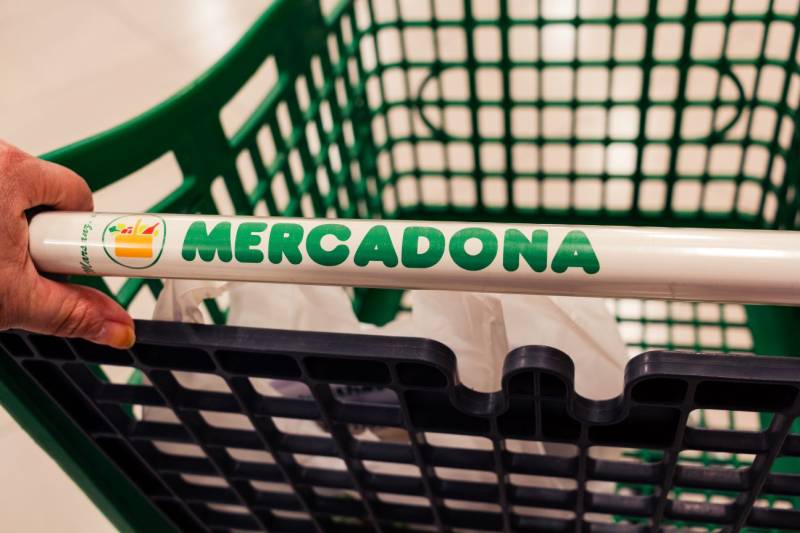
TOP STORY: "Mercadona switches to summer and Sunday opening hours across Spain"
We’re getting into really hot temperature territory now – over 40ºC/104ºF in the shade in parts of southern Spain this weekend, and the heatwave has already claimed one life so far.
Things are hotting up on the world stage too, with Spain drawn into an international spat with Trump, and as we move into the summer season proper, shoppers’ favourite supermarket Mercadona has announced revised opening times. All these stories, plus more from around Murcia, Alicante Andalucía and Spain in this week’s Editor’s Roundup Weekly Bulletin.
NATO hot potato

The big global news story of the week was the recent NATO summit in The Hague, which saw leaders of all 32 member nations agree to a bold new target: by 2035, the NATO countries should be spending 5% of their GDP on defence and security. It’s a hefty commitment, prompted by growing concerns over Russia, terrorism, cyberattacks and general geopolitical instability in the Middle East and beyond. Not for nothing have observers of the Iran-Israel situation been throwing around the phrase ‘World War III’.
Spanish President Pedro Sánchez made headlines at NATO for a couple of reasons: first because he was perceived to be standing too far away from the other NATO leaders, isolated (the other headline to grab people’s attention from the NATO summit was Prime Minister of Albania Edi Rama wearing white trainers instead of formal footwear), and second because he dared to challenge the idea that spending has to be pegged strictly to GDP.
Sánchez argued that Spain can meet NATO’s military capability requirements with just 2.1%, quite a bit lower than the new target. Spain did sign the declaration along with the rest of the alliance, but Sánchez insists that there’s “flexibility” in how each country achieves the target.
Donald Trump wasn’t exactly thrilled. He publicly criticised Spain’s position, calling it unfair to other allies and accusing the country of dragging its heels. He even made a kneejerk threat to double tariffs on Spanish goods to make up for the perceived shortfall in defence spending. But experts have been quick to point out that it’s not that simple. Because Spain is part of the EU, trade policy isn’t something it can be singled out for. Any tariffs would have to go through Brussels, making it nearly impossible for the US to target Spain alone.
Spanish Minister for the Economy Carlos Cuerpo made this very clear, stressing that trade disputes are handled at the EU level, not between individual countries and the US. Analysts agree that, while Trump might be politically posturing, actually slapping Spain with unique tariffs is, in reality, highly unlikely.
Politically, the spat might even play in Sánchez’s favour back home. With pressure mounting over domestic scandals and tensions with his coalition partners, a little diplomatic sparring with Trump could bolster his image among voters on the left who are less enthusiastic about NATO defence spending and more focused on Spain’s social spending on the welfare state’
Interestingly, Spain is one of the few countries in the world that still invests heavily in international humanitarian aid to poorer nations, having promised to allocate 0.7% of its GDP by 2030. If you notice, that’s a lot lower than the defence spending target that has just been agreed to, but still more than most other countries.
Nature needs to be nurtured
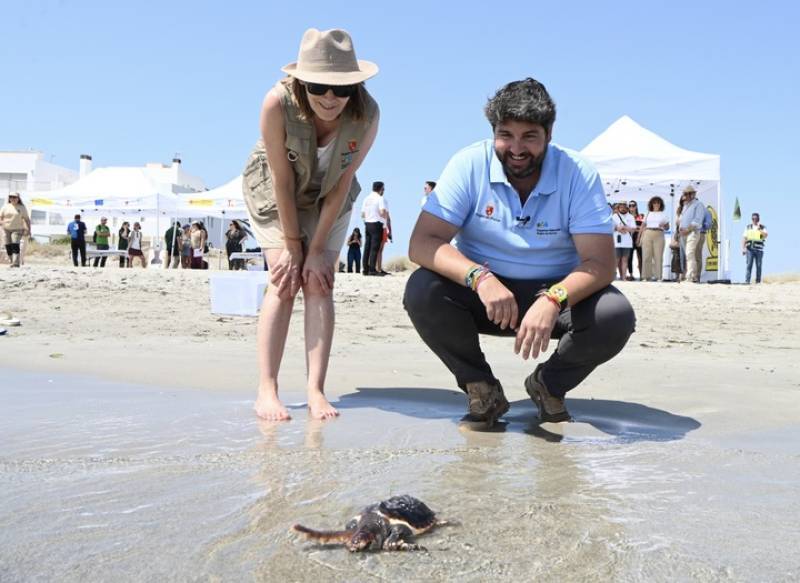
A section on some environmental challenges that the Region of Murcia is grappling with now, some more successfully than others. Take the forests, for instance.
Over the past couple of years, extreme drought has quietly but catastrophically reshaped the landscape in Murcia, killing nearly 1.3 million trees across an estimated 29,578 hectares. In the Carrascoy mountain range alone, over 75,000 pine trees have withered away, leaving a once-lush expanse looking bleak and barren. Drive along the Puerto de la Cadena and it’s hard to miss the impact: patches of grey and brown where green once dominated.
It’s not just a visual tragedy either. While drought is the main villain here, the weakened state of the trees has raised the alarm about opportunistic pests, such as the borer beetle ‘Tomicus destruens’. Experts are worried that come autumn, these beetles could move in and make things much worse by burrowing under the tree bark and cutting off the flow of sap, essentially finishing off trees already on the brink.
For now, pest activity remains low, but that could change fast and forestry teams are keeping a close eye on the situation, supported by seven new monitoring stations and a three-year action plan focused on prevention rather than replanting.
 And it turns out that one of Murcia’s smallest residents, the common weasel, is quietly vanishing too. These pint-sized predators, the smallest carnivores in the world, haven’t been spotted officially in the Region in years. Researchers are now warning that the weasel might be locally extinct. It’s a worrying sign, especially given that these animals were once considered indicators of a healthy, balanced ecosystem. Their decline across Spain is steep, but in Murcia it’s particularly stark: zero sightings, while other small carnivores like polecats still pop up in surveys.
And it turns out that one of Murcia’s smallest residents, the common weasel, is quietly vanishing too. These pint-sized predators, the smallest carnivores in the world, haven’t been spotted officially in the Region in years. Researchers are now warning that the weasel might be locally extinct. It’s a worrying sign, especially given that these animals were once considered indicators of a healthy, balanced ecosystem. Their decline across Spain is steep, but in Murcia it’s particularly stark: zero sightings, while other small carnivores like polecats still pop up in surveys.The reasons for the weasel’s disappearance vary from habitat loss due to changing land use, to rodent poison, roadkill, climate change and even possibly undiagnosed diseases. A big issue seems to be the declining number of voles, their favourite snack, which the changing climate is also helping to deplete. Simulation population models predict an 82-89% drop in weasel numbers by mid-century, but there is hope on the horizon though: a new biodiversity project launching in Cartagena will finally try to find out if any weasels remain in the wild.
Among all the doom and gloom, there is at least one uplifting tale coming out of Murcia, and it involves turtles. Thirty young loggerhead turtles were released back into the Mediterranean at La Manga last week, at the very same beach where their eggs were laid last summer.
Their journey has been carefully managed from the start: after a beachgoer discovered the nest, authorities and volunteers quickly stepped in to protect it. Once the eggs hatched, the baby turtles were whisked off to specialist centres in Murcia, Valencia, Mallorca and Barcelona to give them the best possible start before being released.
Loggerhead turtles are considered vulnerable in Spain and endangered worldwide, so this kind of hands-on conservation is hugely important. This marks the fifth consecutive year that loggerhead nests have been found and successfully hatched along Murcia’s coast, with dozens of new turtles heading into the sea each year. The project, part of a wider EU-funded initiative known as CAMEMMUR, is not only helping these adorable reptiles to survive but also giving scientists a better understanding of marine threats in the region.
The authorities are now reminding people that nesting season has begun again. So if you spot a turtle or tracks in the sand, they ask that you keep your distance and contact emergency services.
There is hope for Murcia’s environment, but the Region still faces serious ecological pressure. The challenge now is to protect what’s left and ensure future stories lean more towards recovery than loss.
🎵 “Mercado-ona, mercadona” 🎵

Maybe it’s just me, but one of my favourite things about the arrival of summer in Spain is being able to nip to the shops on a Sunday! I know there are six more days in the week and, of course, supermarket staff deserve their time off too, but let’s face it: supermarket winter hours, particularly Sunday closures, can be a bit of a pain, especially for holidaymakers flying to Spain late on Saturday.
So if you’re like me and prefer a sedate stroll around the supermarket on Sundays to the Saturday rush, you’ll be delighted to hear that Spain’s favourite chain Mercadona has switched to summer opening hours as of this Monday just gone.
So, from now until August 31, selected stores will open from 9am until 10pm daily, offering customers an uninterrupted 13-hour service window each day.
In addition to longer hours on weekdays, some of these stores will also open on Sundays to accommodate the seasonal surge in visitors. The company recommends that customers check the exact opening hours of their local store by using the search tool available on Mercadona’s official website, as hours can vary depending on location.
These changes will apply primarily to stores located in high-traffic tourist areas, where demand typically increases during the summer months.
For the rest of its 1,602 supermarkets nationwide, Mercadona’s standard summer schedule of 9am to 9.30pm will remain in effect, excluding holidays.
Of course, supermarket staff are compensated extra if they work on a Sunday, either with additional holiday days or in a 25% increase in their hourly rate.
Murcia
This year’s San Juan celebrations certainly lived up to their reputation for late-night revelry and bonfire mischief. Between Monday night and the wee hours of Tuesday morning, the Emergency Coordination Centre handled a whopping 223 incidents, a notable leap from the 156 logged the previous year.
Fires made up the bulk of the activity, unsurprisingly. Emergency services dealt with everything from 38 separate flaming rubbish bins to brush fires and even smoke scares in schools and homes. Cartagena in particular had its hands full. Local crews tackled 57 fires, many of which were uncomfortably close to homes and nature reserves, and one child ended up with a firecracker injury – a small but painful reminder of how easily these festivities can tip into danger.
Despite all the flames and frantic calls, there were no serious injuries or damage reported, which is perhaps a small miracle. Still, officials might be hoping for a slightly less combustible version next year.
In a far more tragic turn of events, two elderly swimmers died in separate incidents on Murcia’s beaches last weekend. The first, an 85-year-old man, lost his life at La Mota beach in San Pedro del Pinatar after apparently swallowing a large amount of water. Despite the quick response from Civil Protection, he could not be revived.
Later that evening, a 65-year-old woman was pulled unconscious from the sea at Las Delicias beach in Águilas. Emergency services attempted CPR and brought in a Mobile Emergency Unit, but sadly she too was pronounced dead at the scene. These tragedies have raised fresh concerns about beach safety, especially as summer gets into full swing.
Meanwhile, over in Lo Pagán, what initially looked like a horrific accident at a local bar is now under criminal investigation. The explosion at Casa Javi injured around 20 people, two of whom sadly died from their injuries this week, and now it seems it may be turning out to be more than just a tragic accident.
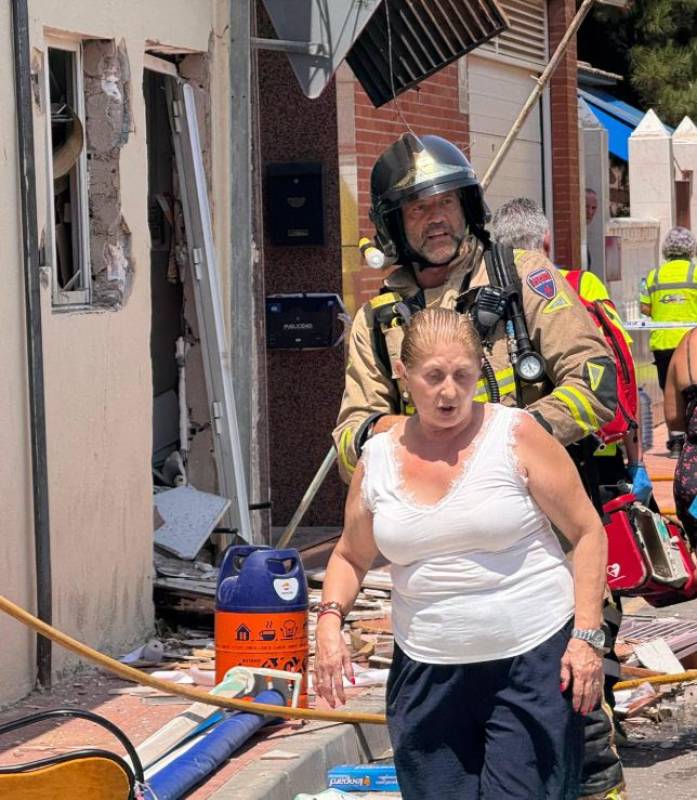 Investigators from the Guardia Civil have pointed to a suspiciously precise cut in the rubber tube of a butane gas canister in the bar, strongly suggesting the blast may have been deliberate. The explosion originated inside the premises, and forensic teams are now treating it as a potential act of arson.
Investigators from the Guardia Civil have pointed to a suspiciously precise cut in the rubber tube of a butane gas canister in the bar, strongly suggesting the blast may have been deliberate. The explosion originated inside the premises, and forensic teams are now treating it as a potential act of arson.Among those seriously injured were the bar manager – a foreign woman who had recently rebranded the space as a tea shop – and a bystander who was caught up in the blast. Both were in critical condition at the Virgen de la Arrixaca Hospital in Murcia until this Thursday, when they both passed away. Interestingly, the bar had a bit of a troubled past, with previous complaints and even a fire about a year ago.
The manager was also reportedly found wandering on the beach the night before the explosion, behaving erratically. Police had been waiting for her to regain consciousness as her testimony could have proved vital in piecing together what really happened, but following her death definitive answers may never materialise.
Elsewhere, a new survey has shed light on the location in Cartagena with the most traffic accidents. The municipality’s worst black spot for car crashes isn’t a busy roundabout or a fast-moving dual carriageway, but the car park of the Cabezo Beaza shopping centre. Yes, really. Out of 134 accidents on urban roads in 2024, 37 took place in that single car park.
It’s a curious statistic that beats far more notorious traffic areas in the city, like the intersection at Paseo Alfonso XIII. While the overall number of road accidents in Cartagena climbed slightly this year to 1,795, the good news is that there were no fatalities reported. Local police have proposed better signage and more pedestrian crossings to improve road safety, especially at the Cabezo Beaza car park!
Finally, changes are coming to Murcia’s Corvera Airport, particularly for UK and other non-EU passengers. The airport’s fancy new biometric border control area is just about ready to use. From October of this year, these electronic passport gates will become the new normal thanks to the EU’s Entry-Exit System (EES). Instead of getting your passport stamped, travellers will have to go through a series of automated checks involving fingerprint scans and facial recognition.
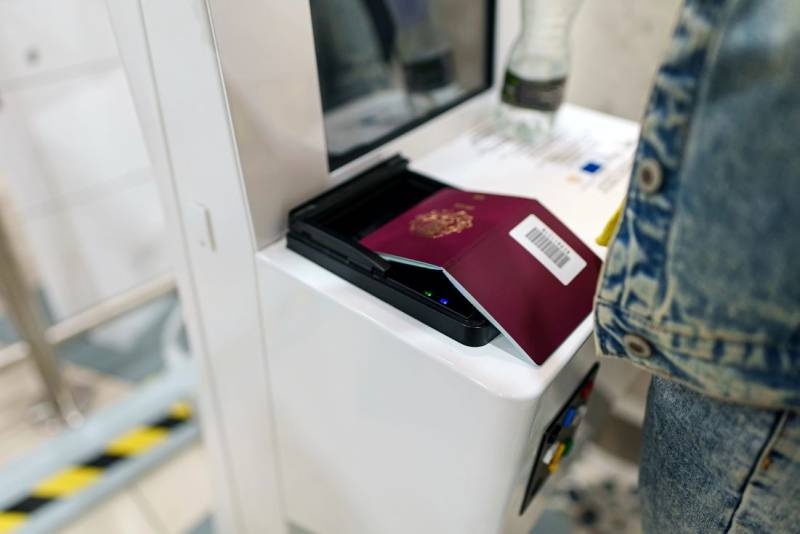
This system will affect pretty much all non-Schengen destinations, which means all UK flights to and from Corvera. The EES, you will remember, aims to monitor the number of days each traveller spends in the Schengen area to better enforce the 90-days-in-180 rule. To add to that, the ETIAS scheme is also on the horizon, expected to roll out in late 2026 or early 2027. The ETIAS will require non-EU travellers who are not residents in the EU (full-time expats, breathe a sigh of relief) to apply for a €7 travel authorisation in advance.
As always, there is plenty going around Murcia on to get your teeth stuck into, from a burger festival starting this weekend in Águilas and going on all week long to the International Melon Week taking place in Torre Pacheco starting from July 1. There are also craft markets in Cehegín and San Javier this weekend, and a curious ‘Tibetan Sound Bath’ at Lorca-castle on Sunday morning for those who fancy trying something a bit different.
See our EVENTS DIARY for more events and activities coming up soon in the Region of Murcia:
Spain
Anyone flying with easyJet this week should keep a very close eye on their emails. A cabin crew strike in Spain has already led to more than 100 cancelled flights, and there is talk of even more disruption coming in August if things do not improve.
 The strike started on Wednesday June 25 and is set to continue through Friday June 27. By Thursday evening, easyJet had cancelled 68 flights across its four Spanish bases in Palma de Mallorca, Málaga, Barcelona and Alicante.
The strike started on Wednesday June 25 and is set to continue through Friday June 27. By Thursday evening, easyJet had cancelled 68 flights across its four Spanish bases in Palma de Mallorca, Málaga, Barcelona and Alicante.On the first day alone, 53 flights were dropped according to official figures, although the USO union puts the number at 62. At the centre of the strike is a dispute over salaries. The USO union, which represents easyJet’s flight attendants in Spain, says they are being paid far less than their colleagues in other European countries.
Pier Luigi Copello, Secretary General of USO at easyJet, explained that Spanish flight attendants earn a base salary of €14,067 per year, while their colleagues in Europe, doing the exact same job, bring in far higher wages. For example, easyJet cabin crew earn 29% more in Portugal and over 200% more in Switzerland.
But there’s a more worrying development for passengers. To try and reduce the impact of the strike, Spain’s Ministry of Transport has imposed minimum service levels. These require easyJet to operate between 81% and 90% of its scheduled flights during the strike, depending on the airport.
However, union sources told the press that even some of these supposedly guaranteed flights have been cancelled as cabin crew rostered to work are calling in sick.
What this will mean for Friday’s flights, and the knock-on effect it could have over the weekend, remains to be seen, but passengers are strongly urged to check the status of their flight before heading to the airport.
That other bastion of our news bulletin, Ryanair, is ruffling feathers again, this time at Birmingham Airport. A British couple, Scott McCormick and Helena Boshwick, were told at the boarding gate there was only one seat left on their flight to Palma de Mallorca, despite having already booked their tickets.
They were given an ultimatum: fly apart or pay nearly €120 to travel together later.
The couple had booked separate seats for their May 1 flight but as they were about to board, they were informed that the airline had swapped out their scheduled Boeing 737 8200 with 197 seats for a smaller 737 800 with only 189 seats. This meant one of them had to miss the flight.
Rather than fly alone ahead of her partner, Helena chose to give up her seat. But when they returned to the check-in desk, they were told Helena would have to pay an additional £100 (€116) to book a seat on the next available flight, even though she hadn’t used her original ticket.
Ryanair explained that the flight wasn’t overbooked but had to change aircraft for operational reasons, which led to one passenger being bumped. They also said Helena had the option to claim expenses, but so far, she hadn’t submitted any receipts.
Scott said: “After a lot of back and forth, we agreed we weren’t going to take separate flights or be in different countries for hours. They said, ‘You can do that, we’ll refund you the full amount of both tickets and put you on the next flight for free.’”
In the end, Scott and Helena had to wait four hours and fork out extra money, leaving them both out of pocket and patience. Good old Ryanair, never fails to deliver an entertaining story.
If you’re thinking about getting your motorbike license in Spain, you’ll want to be aware of some important updates coming into effect this summer. Starting on July 1, there are new rules that will change how people train for and earn their A license, the one that allows you to ride any motorcycle, no matter the size or power.
 One of the biggest changes is the introduction of airbag vests. From now on, anyone taking part in the practical road sessions, including instructors, will need to wear a certified motorcycle airbag vest. It is all part of a broader effort by Spain’s traffic authority, the DGT, to boost rider safety, especially on roads outside of city limits where most serious motorcycle accidents tend to happen.
One of the biggest changes is the introduction of airbag vests. From now on, anyone taking part in the practical road sessions, including instructors, will need to wear a certified motorcycle airbag vest. It is all part of a broader effort by Spain’s traffic authority, the DGT, to boost rider safety, especially on roads outside of city limits where most serious motorcycle accidents tend to happen.Alongside the new gear requirements, the on-road training part of the course is getting a bit longer. Candidates will now spend four hours riding on public roads, up from the current two.
At least half of that time must take place on interurban roads, namely highways and rural routes, to help better prepare riders for real-world conditions.
If you are aiming for an A2 license, which allows you to ride mid-sized bikes, there are a few steps involved. You will need to pass a general theory test similar to the one for car drivers, followed by a second theory test that focuses on motorcycle-specific knowledge. If you already have a car license, you only need to take the motorcycle-focused part.
The DGT is also planning another change that will affect drivers who already hold a standard car license. Right now, if you’ve had a B license for at least three years, you can ride motorcycles up to 125 cc without extra training. But that is about to change. A mandatory training course is on the way, although the exact rollout date has not been confirmed yet.
Alicante
This week along the Costa Blanca, the emergency services were called out to two incidents involving British citizens, one of whom was rescued and the other tragically died. They also managed to save three dogs from drowning.
The sad news that a 51-year-old British man had been killed in a motorbike crash was reported by the Guardia Civil.
They attended the scene, on the CV-715 road in the municipality of Tàrbena (around 30 kilometres inland from Benidorm), on Monday at around 2.15pm. An urgent medical unit (SAMU) also arrived by helicopter, but their attempts to resuscitate the victim were unsuccessful.
It seems that the Briton’s motorbike veered off and crashed into a road sign, and that no other vehicles were involved. At the time of reporting, it was not known whether he was a resident or a tourist, nor whether he had been travelling in the company of other motorcyclists at the time.
In happier news, a 48-year-old British man who became lost while hiking on the Peñón de Ifach, in Calpe, was rescued after spending the night in the mountains.
Esta mañana nuestros rescatadores #cpba acudieron al auxilio de un varón de 48 años que pasó la noche en el Peñón d’Ifach al extraviarse y quedar enriscado en una zona de difícil acceso. Una vez localizado fue evacuado sano y salvo a la helisuperficie de Calpe#siempreatulado pic.twitter.com/j6P2CDo1d7
— Consorcio Provincial Bomberos Alicante (@BomberosDipuALC) June 19, 2025
This plucky trekker kept his head and called the emergency services at around 12.50pm on Thursday June 19, who quickly mobilised specialist teams from the Alicante Provincial Fire Consortium, including the Alpha 01 rescue helicopter and the mountain rescue group (GER).
He was in a steep, rocky area that was difficult to access but fortunately they found him just before 2.45pm and he was airlifted to the helipad in Calpe, where he was examined and determined to be in good health.
Rescue teams praised the man's calm reaction and noted the importance of always carrying a fully charged phone, plenty of water, and of telling someone which route you are planning to take before setting off.
The authorities reminded that mountainous terrain can be treacherous, and even experienced walkers can become disoriented, especially in poor light or unfamiliar conditions. As such, even iconic natural landmarks like the Peñón de Ifach can prove challenging and caution should be taken when heading out to enjoy the spectacular views that it affords of the Costa Blanca.
Another successful rescue saved three lives in El Campello, but this time the creatures in distress were three dogs who had become trapped in a flooded underground drainage chamber.
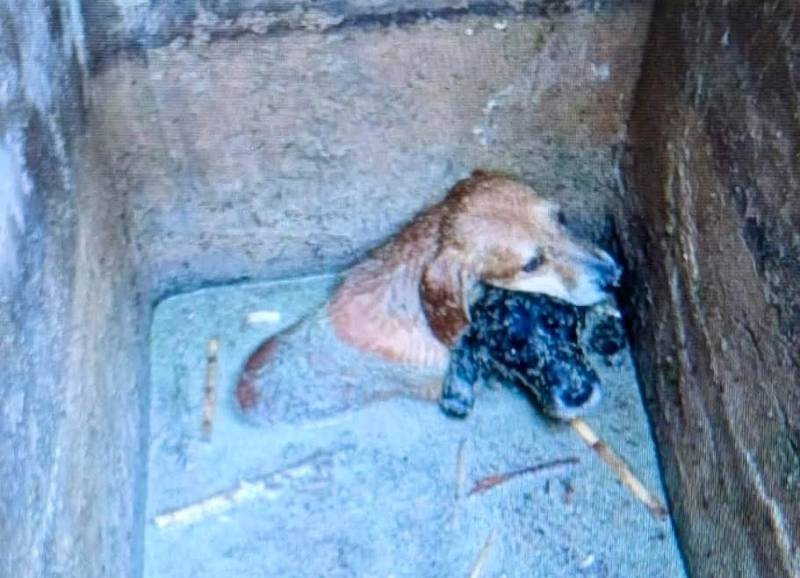
Three local police officers saw that the animals were fighting to survive, half buried in mud with only their little heads and part of their bodies poking above the surface. The officers did not know how long the animals had been down there but could tell that they were suffering from hypothermia and had to be extracted quickly otherwise they were certain to die.
Of course, these poor soggy souls were extremely distressed, particularly the two smallest ones, which repeatedly tried to bite the officer who climbed down into the pit to save them. Nevertheless, the officers managed to extract the dogs unharmed and took them back to the police station for some much-needed food and water.
It was at this point that a microchip was found in one of the dogs, which meant that the police could trace its owner. The owner told them he was away on a trip and was surprised that his animahad escaped from the field where it lives, but immediately contacted his son, who was allowed to collect it, once it had been confirmed that it was up to date with its vaccinations.
However, the other two dogs, which were Dachshund cross breeds, did not have microchips so the local animal protection service took them to the municipal shelter. It is always heart-warning to hear of brave people going to great lengths to save people or animals.
Even though incidents like these are all in a day’s work for the emergency services, who never know when they set out whether it will turn out to be a successful rescue or a tragedy, on this occasion the police officers from El Campello assured it had been especially gratifying.
If you’re out and about in Orihuela Costa this Saturday, be sure to go to the Orihuela Costa Pride celebration with its vibrant celebration of love, diversity and community, held in honour of the beloved Stevie Spit.
The festivities begin at 1pm at the Emerald Isle La Florida, featuring an artisan market with 32 stalls offering local crafts and treats. At 3pm, the colourful Pride Parade sets off, open to all who wish to take part or cheer from the sidelines. From 4pm, the main stage hosts live DJs, energetic performances and entertainment led by drag queen Marcy Morello and Nikki G, with TKO Radio broadcasting live throughout the day.
Whether joining the parade or enjoying the lively atmosphere, it promises to be a joyful and inclusive event for all.
For other events and activities happening in the area, check out the What’s On page of Alicante Today or join the Costa Blanca What’s On and Where to Go Facebook group
Andalucía
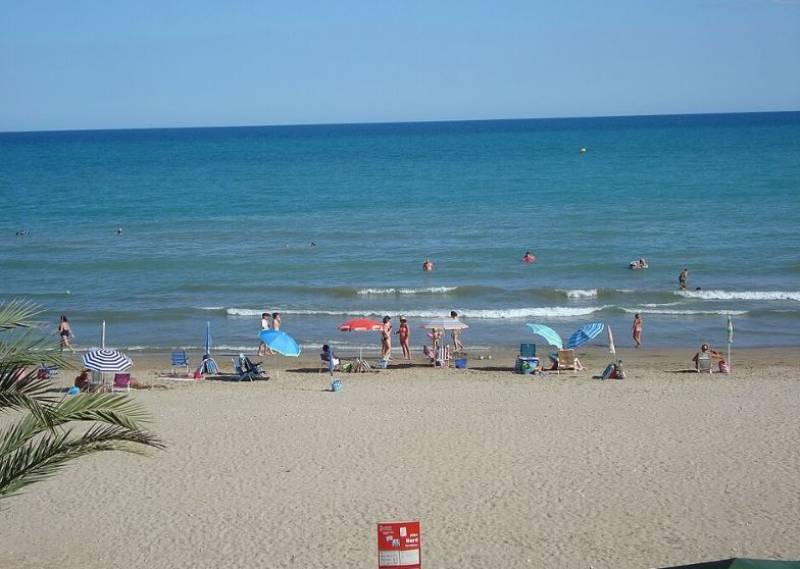 In Fuengirola this past Monday, five members of a Norwegian family found themselves fighting for their lives in the sea at Torreblanca beach. It was just before 11am, only minutes before the town’s lifeguards were due to start their shift, when the family ran into trouble. Fortunately, lifeguards sprang into action just in time and managed to pull all five from the water.
In Fuengirola this past Monday, five members of a Norwegian family found themselves fighting for their lives in the sea at Torreblanca beach. It was just before 11am, only minutes before the town’s lifeguards were due to start their shift, when the family ran into trouble. Fortunately, lifeguards sprang into action just in time and managed to pull all five from the water.Still, it was touch and go for the father and one of his sons, who had to be resuscitated on the sand. Thanks to rapid CPR by emergency personnel, both were stabilised and rushed to Hospital Costa del Sol for treatment.
Sadly, elsewhere on the coast, the outcome wasn’t so fortunate. Over in Cádiz, a 38-year-old Italian man drowned at Santa María del Mar beach later that same day. He’d been at the beach with his parents when another beachgoer spotted him floating face-down in the water.
Lifeguards and emergency services tried for over half an hour to revive him, but it was too late. It’s a stark reminder of how quickly things can turn dangerous in the water, even with warning flags urging caution when swimming in rough or windy conditions.
And these aren’t isolated incidents. The summer season has only just begun, but Andalucía has already recorded multiple drowning fatalities. Just this month, a 12-year-old child lost their life in a private pool in Mijas, and in May, a 57-year-old British tourist drowned while swimming in the sea off Fuengirola. It’s a tragic trend that’s casting a shadow over beach days that should be carefree.
Meanwhile, back on dry land in Benalmádena, the seal was lifted this Monday on the front doors of the four-star Vivemar Hotel, which had been taped off by police because the hotel was apparently operating without being officially registered in Andalucía’s tourist accommodation registry.
The 200 guests staying there were allowed to stay and had been entering and exiting via the car park and navigating through under-construction areas just to get to their rooms or find the pool. Now, the hotel’s operating company has submitted a “declaration of responsibility” claiming a change of ownership had taken place and allowing the hotel to reopen its main entrances and resume normal operations.
However, officials have made it clear that the property still hasn’t completed its registration process. Until that’s sorted, there’s a legal grey area about whether it should be serving guests at all. On top of that, the hotel’s ownership is currently tangled in legal disputes over a supposedly fraudulent contract transfer. Not exactly a smooth summer for them, either.
As the summer heats up (and up and up!), the Spanish heatwave has already turned deadly. Last Saturday, a 58-year-old man from Córdoba died after suffering heatstroke. The temperature that day was recorded as having soared to 40.4ºC, making it the third day in a row that highs breached the 40º mark. It was also the first official day of summer, and the season’s first heat-related death in Andalucía.
Authorities have since confirmed that eight cases of heatstroke have already been reported across the region, with half requiring hospitalisation. The Andalusian Coordination Protocol against Excessive Temperatures is now fully in effect, guiding local governments and the public on how to reduce risks during extreme heat. There’s plenty of common-sense advice: avoid being outside during the hottest hours, stay hydrated, wear light clothing and take special care if you’re working out in the sun.
As the mercury continues to rise (it is forecast to be over 40ºC in parts of southern Spain again this weekend), please remember just to be careful and stay safe, whether you’re going for a swim, checking into a hotel or just walking down the street.

You may have missed…
- Spanish city starts building world’s largest Christ statue.
Spain has long been a deeply religious country and still, to this day, the country is world-renowned for its spectacular holy festivals, pilgrimages and processions. The Spanish motto in this regard definitely seems to be ‘go big or go home’, as evidenced by its latest endeavour: to construct the largest statue of Christ in the entire world. - Mar Menor cracks down on unlicensed boats, illegal jetskis and dodgy rentals.
The summer season has barely started in the Mar Menor, but officials are already dealing with a long list of familiar problems. From unlicensed boat rentals to reckless jetskiing and petty theft at the ports, it is the same issues that crop up every year. This summer, authorities say they are tightening the net. - New energy label for mobiles and tablets aims to cut waste and help shoppers choose better.
A new energy label is now required on all mobile phones and tablets sold across Spain and the European Union. The label is designed to make it easier for consumers to choose devices that are not only efficient and durable, but also easier to repair. - Spain’s top court backs Amnesty Law despite huge public opposition.
The Constitutional Court has delivered a landmark ruling that upholds the controversial Amnesty Law for Catalan separatists, removing the final legal barrier to its implementation and potentially reshaping the country’s political landscape forever. - Passengers could soon be allowed TWO carry-ons if EU proposal is passed.
European travellers could soon get the right to bring a 7kg carry-on bag on flights without paying extra fees, after parliamentarians from the transport committee approved new passenger rights rules on Tuesday June 24.
And that’s all for this week. Thanks for reading and we’ll be back next week with another edition.
Have a nice weekend!
Contact Murcia Today: Editorial 000 000 000 /
Office 000 000 000


















